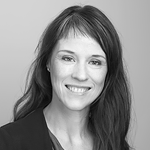
FM goes digital
Successfully navigating today’s digital paradigm shift is an art. In IT, solutions are now smart, cheap and simple enough to be applied to a range of different areas. How does this affect the FM sector? We’ve spoken to Ylva Berg, Coor’s CIO, to better understand the opportunities – and the challenges – this presents.
It's immediately apparent that Ylva Berg is well informed about the latest developments in IT. In our short 15 minute interview, she manages to bring up the internet of things, big data, analytics, tracking, personalization and customer digital journeys. But what does this have to do with FM services?
"Understanding how new technology can streamline and improve business operations, is a critical factor for all businesses today. A high degree of business development is driven by IT innovation. Virtually all types of operations can be rationalized by introducing digital solutions, in production and support processes such as administration, distribution, logistics and marketing/sales," Ylva Berg, Coor's CIO explains.
Ylva Berg has been with Coor for 8 years. She considers the Nordics to be generally well positioned in terms of digital maturity, and that the FM sector is relatively up-to-date. Growing demand from customers is a major driver.
"Many of our customers are at the leading-edge in terms of their approach, and make high demands on us as a service provider. All major FM operators in the Nordics are currently considering how to increase their use of technology. This is particularly important for Coor, as our express ambition is to deliver leading-edge FM services. One factor in our favor is that we're a relatively agile company that embraces change, while we also have a clear improvement culture. Continuously improving our operations is in our DNA, and this facilitates the transition to the new digital reality.
IT is a strategic tool which, when used appropriately, can support business development and operational progress.
One of the hardest tasks a CIO faces is to set the right priorities – a misguided initiative could have disastrous consequences. Coor's IT function has been tied in more closely with operational activities for a few years, and is high on management's agenda, which has created the right conditions for Coor's successful IT development work.
"IT is a strategic tool which, when used appropriately, can support business development and operational progress. In order to make the right contribution, we need to understand our customers' general and operational needs in depth, and create the right solutions on that basis. This means that the IT function can't act in isolation, but needs to work in close collaboration with business activities, and be viewed as a natural and integral part of operations.
Nor is it possible to successfully navigate this landscape without collaborating with external operators. Coor is continuously seeking new partnerships and testing solutions alongside external experts, customers and suppliers. Ylva Berg explains that Coor's innovation ecosystem is the overall external and internal network where new ideas are sourced and tested.
Ylva Berg also explains that Coor's digital development work is essentially focused on two areas: developing Coor's offering and customer solutions, and streamlining and improving internal processes. Coor works with a broad palette, but has identified a number of areas that are of particular interest. One example is how Coor can improve the experience for its end consumers, i.e. our customers' employees, through more attractive and personalized digital interfaces. Other examples include how different systems can be connected and communicate with each other (the internet of things), and how data and expertise can be packaged and shared with customers and partners (big data and analytics).
In terms of improving internal processes, efforts are currently focused on optimizing case management and purchasing processes. Extensive, in-depth work has recently been completed on automating authorization procedures, spanning both HR and IT processes.
"Although we have a clear plan for our development work, it's important to remain flexible and adjust plans as new needs and opportunities arise. Getting locked into a fixed position is not an option in a changeable world. Timing and setting the right priorities are also important factors. Our basic philosophy is to actively monitor and explore new technology in order to be able to introduce solutions that generate operational and business benefits quickly and across the board.

